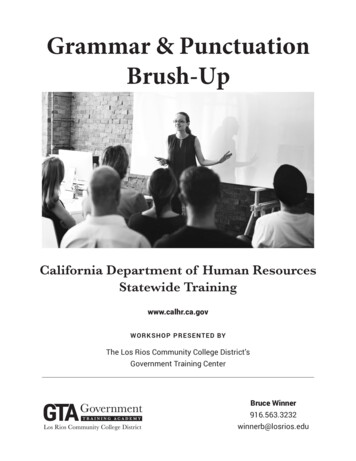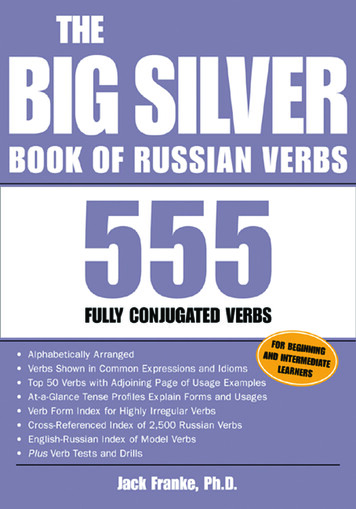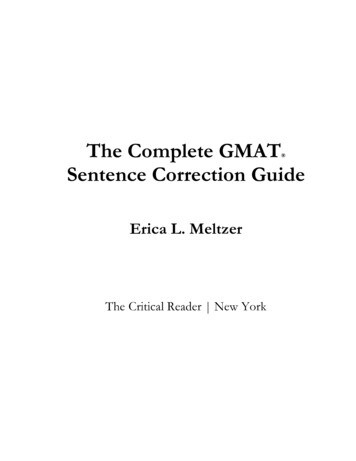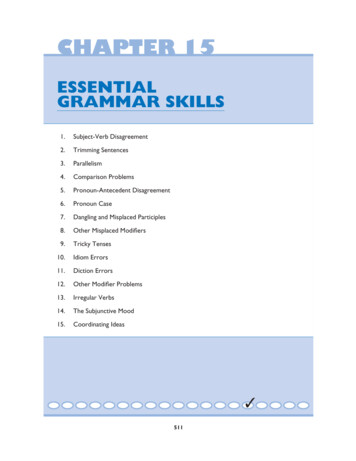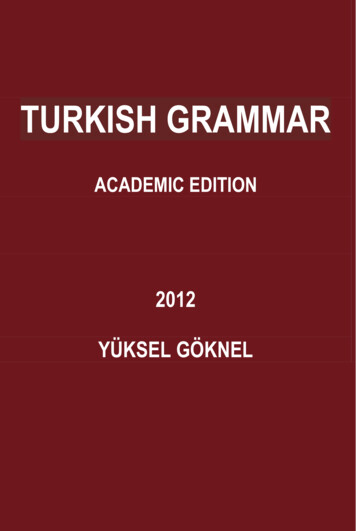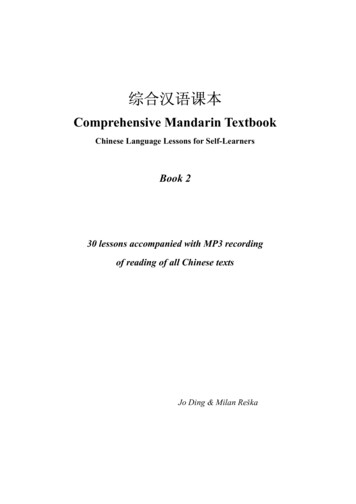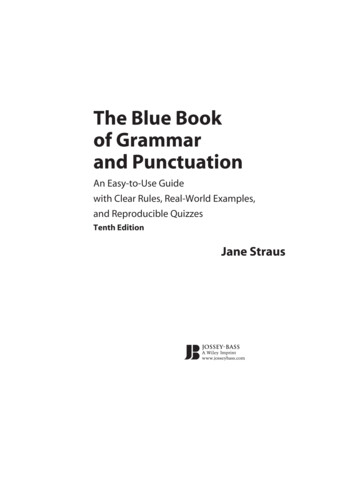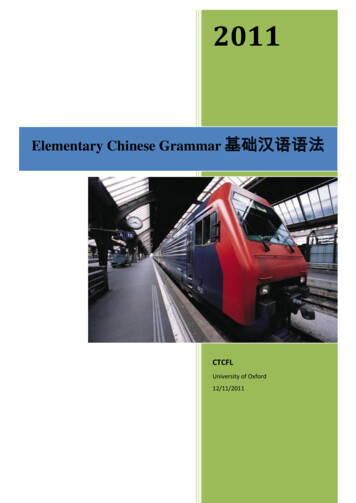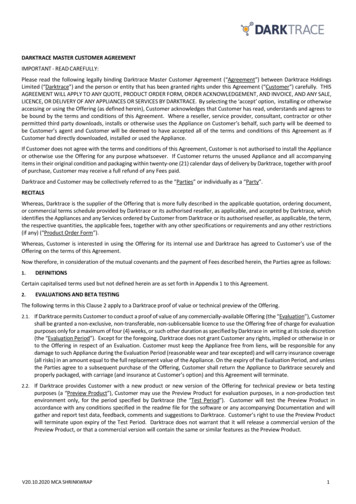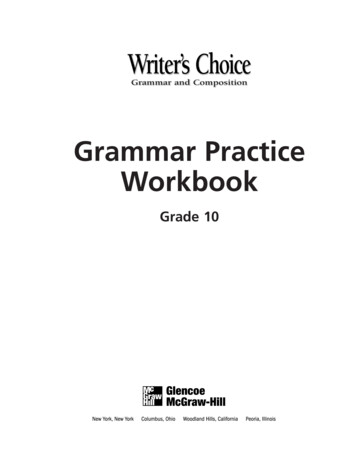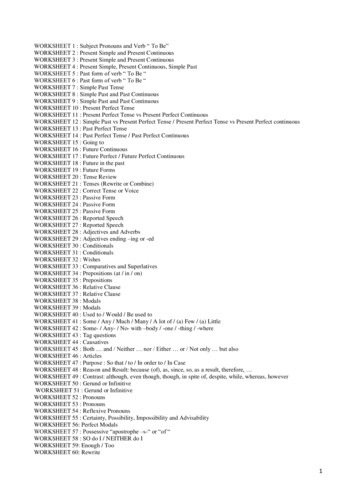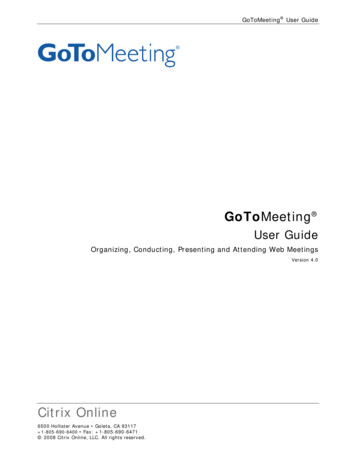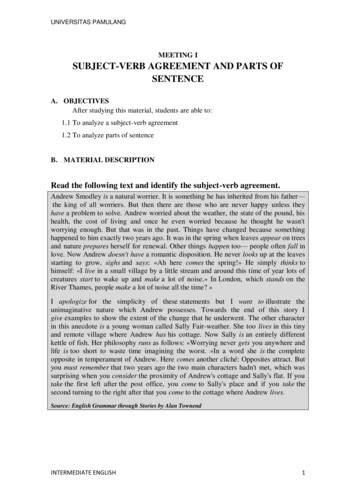
Transcription
UNIVERSITAS PAMULANGMEETING ISUBJECT-VERB AGREEMENT AND PARTS OFSENTENCEA. OBJECTIVESAfter studying this material, students are able to:1.1 To analyze a subject-verb agreement1.2 To analyze parts of sentenceB. MATERIAL DESCRIPTIONRead the following text and identify the subject-verb agreement.Andrew Smodley is a natural worrier. It is something he has inherited from his father—the king of all worriers. But then there are those who are never happy unless theyhave a problem to solve. Andrew worried about the weather, the state of the pound, hishealth, the cost of living and once he even worried because he thought he wasn'tworrying enough. But that was in the past. Things have changed because somethinghappened to him exactly two years ago. It was in the spring when leaves appear on treesand nature prepares herself for renewal. Other things happen too— people often fall inlove. Now Andrew doesn't have a romantic disposition. He never looks up at the leavesstarting to grow, sighs and says: «Ah here comes the spring!» He simply thinks tohimself: «I live in a small village by a little stream and around this time of year lots ofcreatures start to wake up and make a lot of noise.» In London, which stands on theRiver Thames, people make a lot of noise all the time? »I apologize for the simplicity of these statements but I want to illustrate theunimaginative nature which Andrew possesses. Towards the end of this story Igive examples to show the extent of the change that he underwent. The other characterin this anecdote is a young woman called Sally Fair-weather. She too lives in this tinyand remote village where Andrew has his cottage. Now Sally is an entirely differentkettle of fish. Her philosophy runs as follows: «Worrying never gets you anywhere andlife is too short to waste time imagining the worst. »In a word she is the completeopposite in temperament of Andrew. Here comes another cliché: Opposites attract. Butyou must remember that two years ago the two main characters hadn't met, which wassurprising when you consider the proximity of Andrew's cottage and Sally's flat. If youtake the first left after the post office, you come to Sally's place and if you take thesecond turning to the right after that you come to the cottage where Andrew lives.Source: English Grammar through Stories by Alan TownendINTERMEDIATE ENGLISH1
UNIVERSITAS PAMULANG1. Subject-verb agreementSubject verb agreement simply means the subject and verb must agree innumber. This means both need to be singular or both need to be plural.Agreement (noun): in language, the form of one word being decided bythe form of another word. Also known as "concord".Subject-Verb Agreement RULE #1 (Basic Rule)The subject and verb must agree in number. A singular subject takes a singularverb, whereas a plural subject takes a plural verb.Subject verb agreement examples:A good medicine tastes bitter.He goes to work by bus.They visit us every other week.Subject-Verb Agreement RULE #2The subject is separated from the verb by “with”, “as well as”, “together with”,“along with”. These words and phrases are not part of the subject. The verbagrees with the subject.INTERMEDIATE ENGLISH2
UNIVERSITAS PAMULANGThe politician, along with the newsmen, is expected shortly.Subject-Verb Agreement RULE #3Two subjects joined by “and” are plural.Mary and Joan are quite different.Subject-Verb Agreement RULE #4Two subjects joined by “or/not”, “either or/neither nor”, “not only butalso” take the verb that agrees with the subject closest to it.Subject verb agreement examples:Neither my mother nor my father goes to university.Either my father or my brothers are coming.Not only you but also I am planning to go.Subject-Verb Agreement RULE #5With collective nouns, the verb might be singular or plural (UK), depending onmeaning.Subject-verb agreement examples:The audience was clearly enchanted by her performance.The audiences are strangely subdued, clapping politely after eachsong.Subject-Verb Agreement RULE #6In sentences beginning with “here” or “there“, the true subject follows the verb.There is a bush near the school playground.Here are the keys.Subject-Verb Agreement RULE #7The verb is singular if the subject is a singular indefinite pronoun such as each,either, neither, one, no one, every one, someone, anyone, nobody, somebody,anybody, everybody, one, no.Nobody gets rich from writing nowadays.Either of the plans is equally dangerous.The verb is plural if the subject is a plural indefinite pronoun such as several,few, both, and many.INTERMEDIATE ENGLISH3
UNIVERSITAS PAMULANGSeveral villages have been isolated by the heavy snowfall.And, some indefinite pronouns (some, any, all, and most) may be either singularor plural, depending upon their use in a sentence: with uncountable, use singular;with countable, use plural.Some of the books are out of place. Please put them in the rightorder.(Books are countable.)Some of the music was weird.(Music is uncountable.)Subject Verb Agreement RULE #8Use a singular verb for expressions of measurement, time, money and weightwhen the amount is considered one unit.Fifty dollars seems a reasonable price.Three miles is too far to walk.BUT:Five dollars were scattered on the ground.Subject Verb Agreement RULE #9Plural form subjects with a singular meaning take a singular verb (such asmumps, home economics, social studies economics, measles, calisthenics,statistics, civics, physics, gymnastics, phonics, news, acrobatics, aesthetics,thesis, mathematics ).Gymnastics is his favorite sport.Mathematics is the science of pure quantity.Subject Verb Agreement RULE #10Titles of single entities (books, organizations, countries, etc.) are alwayssingular.Harry Potter is an interesting novel.INTERMEDIATE ENGLISH4
UNIVERSITAS PAMULANGINTERMEDIATE ENGLISH5
UNIVERSITAS PAMULANG2. The Parts of the SentenceWhat Are the Parts of a Sentence?A sentence must minimally have a subject and a verb. Sometimes the subject canbe omitted if it is understood. Examples as follow: Bold for Subject and Italicfor Verb.Tom walks.We met Susan.They are washing the dishes.Lisa will arrive soon.She is nice.There is food on the table.The parts of the sentence are a set of terms for describing how people constructsentences from smaller pieces. There is not a direct correspondence between theparts of the sentence and the parts of speech -- the subject of a sentence, forexample, could be a noun, a pronoun, or even an entire phrase or clause. Likethe parts of speech, however, the parts of the sentence form part of the basicvocabulary of grammar, and it is important that you take some time to learn andunderstand them.Sentences consist of a number of parts, using different parts of speech. The mostimportant parts of speech are:The subject, which is either a noun phrase or a pronoun. Normally the subjectcomes before the verb phrase in a sentence.The girls had been swimming.The new teacher came in.They had finished.The verb phrase, which includes the main verb and which may have auxiliaryverbs to go with it.The girls had been swimming.The new teacher came in.They had finished.She uses her skateboard quite a lot.Rajiv was reading a new novel.She is riding someone else’s horse.The object, which is a noun phrase or a pronoun.She used her old skateboard.INTERMEDIATE ENGLISH6
UNIVERSITAS PAMULANGRajiv was reading a new novel.Josh found it.Not all verbs need an object. When there is one, the object normally comes afterthe verb phrase. Some verbs may also need an indirect object.Hamish gave me a party invitation.Ruth gave Lauren a nice bunch of flowers.An adverbial, or adjunct, which is an optional part of the sentence.This may be:a single word, an adverb.Suddenly, it started to rain heavily.An adverbial phrase, a group of words that functions as an adverb.In the morning, the sky was clear.You probably won’t notice it after a while.An adverbial clause, a group of words including a verb, which functions as anadverb.I’ll get some biscuits for you when I’ve poured the drinks.When I’ve poured the drinks, I’ll get some biscuits for you.Mark played while Isabel sang.Though some adverbials have a fixed position, most can be added to a sentencein several places. Any number of them can be added, limited only by the senseof the sentence.In the winter, the roads get very slippery.The roads get very slippery in the winter.A complement. With certain verbs, such as be and seem, a complement takes theplace of an object. A complement can be either an adjective or a noun phrase.Complements provide further descriptive detail about the subject.He became a doctor in 2005.Andrew is a motor-mechanic.He felt a bit silly when he realized what he’d done.They became good friends despite the mistake.INTERMEDIATE ENGLISH7
UNIVERSITAS PAMULANGC. EXERCISESEXERCISE 1A. Directions: Underline the correct verb in these sentences.1. Sally (run, runs) to the park every day.2. The dogs (bark, barks) at strangers.3. Ted and Mary (is, are) going to the movies.4. The game (was, were) exciting.5. They (worry, worries) too much.6. She (study, studies) every night.7. Black or white (is, are) your choice.8. That (was, were) incredible.9. Those (is, are) pretty shoes.10. The cat or dog (is, are) in the yard.B. Directions: Put a C if the sentence is correct, an X if it is not correct.1. They have been waiting a long time.2. The pen or the pencil are lost.3. Someone don't understand.4. Those has been cheaper in the past.5. Randy and Juan like sports.6. These are really special.7. You rides with me.8. All of them goes to school.INTERMEDIATE ENGLISH8
UNIVERSITAS PAMULANG9. Tony likes Mary.10. That movie was awesome.EXERCISE 2A. Directions: Underline the correct verb in these sentences.1. The girl or her sisters (watch, watches) television every day.2. Rob and his brothers (doesn't, don't) like sports.3. His classmates (study, studies) before a test.4. One of the cookies (is, are) missing.5. A lady with 10 cats (live, lives) in that big house.6. Mumps (is, are) very serious.7. The committee (decide, decides) when to adjourn.8. Our team (is, are) the best.9. Everybody (enjoy, enjoys) a good song.10. Either (is, are) suitable.B. Directions: Put a C if the sentence is correct, an X if it is not correct.1. Cats and dogs love to run.2. He don't like chocolate.3. Her friends or Sarah excel at volleyball.4. Each of these have been ruined.5. Trousers are baggy now.6. The students, as well as the teacher, are nervous about the test.7. The news are on at 10.INTERMEDIATE ENGLISH9
UNIVERSITAS PAMULANG8. My family are a lot of fun.9. Mathematics is hard for many.10. The director, with all the cast members, works very hard.D. ATE ENGLISH10
MEETING 2GERUND AND INFINITIVEA.OBJECTIVES OF THE STUDYAfter studying this material, students are able to analyze gerund and infinitive.B.MATERIAL DESCRIPTIONLook at the image and try to understand it.Intermediate English 11
1. What are Gerunds?A gerund is a verb in its -ing (present participle) form that functions as a noun thatnames an activity rather than a person or thing. Any action verb can be made into agerund.Add ing to most verbs. Ex. play playing, cry crying, bark barkingFor verbs that end in e, remove the e and add ing. Ex: slide sliding, ride ridingFor verbs that end in ie, change the ie to y and add ing. Ex: die dying, tie tyingFor a verb whose last syllable is written with a consonant-vowel-consonant and isstressed, double the last letter before adding ing.Intermediate English 12
Ex: beg begging, begin beginning. However: enter entering (last syllable is notstressed)Gerund ExamplesGerunds can appear at the beginning of a sentence when used as a subject:Jogging is a hobby of mine.Gerunds can act as an object following the verb:Daniel quit smoking a year ago.Gerunds can serve as an object after a preposition:I look forward to helping you paint the house.Some verbs and verb phrases are directly followed a gerund:Paul avoids using chemicals on the vegetables he grows.Some verbs can be followed by a gerund or an infinitive without causing a changein meaning:Some people prefer getting up early in the morning.Some people prefer to get up early in the morningSome verbs can be followed by a gerund or infinitive but with a change inmeaning:He remembered sending the fax. (He remembered the act of send the fax)He remembered to send the fax. (He remembered the fax and sent it.)2. What are Infinitives?An infinitive is a verb form that acts as other parts of speech in a sentence. It is formedwith to base form of the verb. Ex: to buy, to work.Infinitive ExamplesInfinitives can be used as: an object following the verb:Jim always forgets to eatIntermediate English 13
a subject at the beginning of a sentence:To travel around the world requires a lot of time and money. an adverb modifying a verb:You promised to buy me a diamond ring. an adjective modifying a noun:Tara has the ability to succeed. Some verbs are directly followed by an infinitive:Do you want to call your family now? Some verbs are directly followed by a noun or pronoun and then by an infinitive:I convinced Catherine to become vegetarian.He advised me to sell all my shares of stock. Some verbs can be followed by an infinitive or a gerund without causing achange in meaning:Will you continue working after you give birth?Will you continue to work after you give birth? Some verbs can be followed by an infinitive or a gerund but with a change inmeaning:He stopped drinking coffee. (He never drank coffee again.)He stopped to drink coffee. (He stopped what he was doing and drank somecoffee.)Intermediate English 14
C. EXERCISESEXERCISE 1Choose the correct gerund or infinitive from the parenthesis at the end of thesentence.Alan can’t stand on trains. (riding/ to ride)Mr. Harris enjoys people out to dinner. (inviting / to invite)In the old days, gentlemen challenged their rivals . (fighting / to fight)As the famous saying goes, there’s no use over spilt milk. (crying / tocry)5. Jim stopped his shoelace. Wait for him. (tying / to tie)6. My wife always volunteers cakes PTA meetings. (baking / tobake)7. Don’t waste my time about your salary. (complaining/ tocomplain)8. Eva is having trouble on the exam. (concentrating / to concentrate)9. Please allow me your Facebook page. (joining / to join)10. You won’t forget milk on your way home, will you? (picking up /topick up)EXERCISE 2Choose gerund or infinitive form of the verbs.1. Belinda is looking forward to (have) a reply from his friend.2. Hey, you look tired! How about (take) a break from work for a bit?3. I can't afford (have) my Master's degree at a private university.4. The criminal avoided (confess) the truth.5. The clients decided (cancel) the contract.6. If you don't give up (talk) too much, everybody will get bored.7. Ken's lawyer advised him (call) his wife as soon as possible.8. Helen's boyfriend asked her if he fancies (grab) a cup of coffee.9. After the accident, the old man struggled (stand up).10. The beautiful girl denied (be) in love with the suspect.EXERCISE 31.2.3.4.Choose gerund or infinitive form of the verbs.Intermediate English 15
D. 1767/Intermediate English 16
MEETING 3MULTIPLE CLAUSES: NOUN CLAUSEA. OBJECTIVES OF THE STUDYAt the end of the lesson, the students are able to:1. Understand the concept of multi-clauses sentence;2. Identify noun clauses; and3. Write sentence with noun clause.B. MATERIAL DESCRIPTION1. Introduction to Multiple ClauseBefore proceeding to talk about noun clause, a discussion about thedistinction between sentences and clauses must be made. A clause, in English, isgrammatical unit that consist of one (1) Subject and one (1) Verb. Meanwhile, asentence is grammatical unit comprise of one or more clauses.Understanding the difference between a sentence and a clause isimportant and will and how clauses combine to form sentence is important inorder to develop a more sophisticated writing skill. This is because sentenceswith multiple clauses allow the integration of several ideas into a singlegrammatical unit which makes writing more compact and clearer. In Meeting 3,as well as 4 and 5, the discussion will focus on improving the ability to composeappropriate sentences comprising multiple clauses.2. Types of Multiple Clauses SentencesIn order to make sentences comprises of multiple clauses, clause shouldbe combined through coordination and/or subordination. This will result in threedifferent types of multi-clauses sentences:1. Complex sentence;2. Compound sentence; and3. Compound-complex sentence.A multi-clause sentences consist of main clause and subordinate clauseor also known as independent clause and dependent clause. The term“dependent” stems from the character of the clause that is grammaticallydependent on some element of the main clause (independent clause). Adependent clause may function as a subject, complement, or modifier of themain clause.INTERMEDIATE ENGLISH 17
2.1 Compound sentenceIn compound or coordinated sentences, two or more clauses arebrought together as grammatical equals, connected by a coordinatingconjunction to one another. Table 1 below shows the CoordinatingConjunctions.Table 1 Coordinating ConjunctionsCoordinating ConjunctionsAndOrButSoYetIn order to form a multi-clauses sentence, two clauses must correctlyjoined by placing a conjunction and a comma between the two clauses. Beloware the examples of connecting two clauses with coordinating conjunctions tofor a compound sentence.ExampleAndy is singing, and Cindy is dancing.Andy is tall, but Cindy is shortAndy must write the letter, or Cindy will write it.Andy told a joke, so Cindy laughed.Andy is tired, yet Cindy is not going to sleep.In compound sentence, no clause is subordinate to another, hence all theclauses in a compound sentence are main clauses.2.2 Complex sentenceA complex sentence contains one or more subordinate clauses (bolded).ExampleCindy believes that she is being followed byINTERMEDIATE ENGLISH 18
Sentence breakdownCindy believesthatthat she is being followed by someone.Main ClauseConjunctionSubordinate ClauseBeside compound and complex sentence. There is compound-complexsentence which is a combination of complex and compound sentences. It consistof coordinated clauses (bolded) that are subordinate to another clause.ExampleAndy believed that novels should have redeeming social value, andthat his writing might help improve conditions of the society.Sentence BreakdownAndy believedthatnovels should have redeeming social valueMain ClauseConjunctionSubordinate Clauseandthat his writing might help improve conditions of thesociety.Coordinate Conj.Coordinate ClauseIn another one or more of the coordinate clauses may include one ormore subordinate clauses (bolded).ExampleCompound-complex sentences consist of at least two coordinate clauses and atleast one of those must contain a clause which is subordinate to it.Sentence BreakdownCompound-complex sentences consist of at least two coordinate clauses,INTERMEDIATE ENGLISH 19
Coordinate Clause 1compound-complex sentences consist of at least twocoordinate clausesCoordinate Clause 2andCoordinate Conj.whichis subordinate to it.ConjunctionSubordinate Clause3. Noun ClauseAfter understanding the concept of multi-clause sentences. In thissection, the discussion moves to the subordinate clause in a complex sentencethat may function as a noun—the noun clause. Since noun clause is a noun, in asentence, it is used either as an object of a verb, object of preposition, or thesubject of the sentence.3.1 Noun Clause that function as objectThe sentence below is an example of a noun clause that function asobject of a verb.ExampleIknowSubjectwhenhewill arrive.ConjunctionSubjectVerbVerbObjectMain ClauseNoun ClauseIn the example above, there are two clauses: “I know” and “he willarrive”. These two clauses are joined with the conjunction when. “When”changes the clause “he will arrive” into a noun clause which functions as theobject for the verb “know”.We know that the clause is the object of the verb precedes it because ifwe substitute a pronoun for the clause it must be in its object form. We canINTERMEDIATE ENGLISH 20
substitute accusative pronouns for them. The example below shows how a clauseis replaced by a pronoun in an object form.Example: Noun Clause as ObjectWebelieveSubjectVerbwhenhemadea great deal.Conj.SubjectVerbObjectObjectMain ClauseNoun ClauseExample: Pronoun as ObjectWebelieveit.SubjectVerbObject3.2 Clauses that function as objects of prepositionsIn English sentence, there is an object that belongs to a preposition,hence called Object of Prepositions. An object of preposition is a noun, pronoun,or noun clause that comes after a preposition such as in, at, of, to, by, behind, on,etc which then result to form a prepositional phrase.ExampleIam concernedSubjectaboutwhenhewill arrive.ConjunctionSubjectVerbVerbprepositionMain ClauseObject of PrepositionNoun ClauseWe know that the clause is the object of the preposition that precedes itbecause if we substitute a pronoun for the clause it must be in its object form.The example below shows how a clause is replaced by a pronoun in an objectform.INTERMEDIATE ENGLISH 21
Example: Noun Clause as ObjectWeleftthe crumbsSubjectVerbObjectforPrepositionMain Clausewhicheverbirdscame by.SubjectVerbObject of PrepositionNoun ClauseExample: PronounWeleftthe crumbsSubjectVerbObjectforthemSubject (Pronoun)PrepositionMain ClauseObject of PrepositionNoun Clause3.3 Clauses that function as subjectsNoun clauses can also appear as subjects of the sentence. Below is theexample of how a noun clause functions as the subject of a sentence.ExampleWhenhewill arriveConj.SubjectVerbisnot certain.VerbAdjectiveSubjectNoun ClauseMain ClauseThe example above is quite complex. There are two clauses in theexample, but they are harder to recognize. He will arrive is one of the clauses,and the connector “when” changes it into a noun clause. This noun clausefunctions as the Subject of the sentence. This means that this noun clausefunctions as the Subject of the main clause. The main clause contains the verb“is”.INTERMEDIATE ENGLISH 22
We know that the clause is the subject of the sentence because if wesubstitute a pronoun for the clause it must be in its subject form. The examplebelow shows how a clause is replaced by a pronoun in a subject form.Example: Noun Clause as n ClauseGrammarObjectprovesmy point.VerbObjectMain ClauseExample: Pronoun substitute Noun ClauseItprovesmy point.SubjectVerbObject4. Connectors for Noun ClauseMulti-clauses sentence use connectors to introduce the second clause(applies for both dependent and independent clause). Table 2 below lists thenoun clause connectors.Table 2 Connectors for Noun ClauseBelow are the examples of sentence patterns that can be used with theConjunctions in Table Example: Main Clause Noun Clause VerbObjectMain ClauseINTERMEDIATE ENGLISHNoun Clause 23
Example 2: Noun Clause Main Clause tiveSubjectNoun ClauseMain ClauseC. EXERCISES1.Identifying Noun ClauseExercise a: Identifying Noun clausesDirections: Add the necessary punctuation and capitalization to the following. Underline thenoun clauses.1. I couldn’t hear the teacher what she said I couldn’t hear the teacher. What did she say?2. I couldn’t hear what the teacher said.3. Where did Tom go no one knows4. No one knows where Tom went5. Where Tom went is a secret6. What does Anna want we need to know7. We need to know what Anna wants8. What does Alex need do you know9. Do you know what Alex needs10. What Alex needs is a new job11. We talked about what Alex needs12. What do you need did you talk to your parents about what you need2.Sentence MakingExercise 1: Noun Clause as Object1. Create five sentences in which a noun clause functions as Object.2. Apply the pronoun tests described above to demonstrate that the noun clauses reallyfunction as subjects.INTERMEDIATE ENGLISH 24
Exercise 2: Noun Clause as Object of preposition1. Make up five new sentences with a noun clause as objects of preposition.2. For each of the sentences you constructed, show that your noun clause is in fact the objectof its preposition by replacing it with object pronoun.Exercise 2: Noun Clause as Subject1. Create five more sentences in which noun clause functions as subject.2. Apply the pronoun tests described just above to demonstrate that the Noun Clauses reallyare subjects.D. REFERENCESAzar, B. S. 2002. Understanding and Using English Grammar. New York: PearsonEducation.Delahunty, G. P., & Garvey, J. P. 2010. The English Language: From Sound toSense. Colorado: The WAC Clearinghouse.Phillips, D. 2001. Longman Complete Course for the TOEFL Test. New York:Pearson Education.INTERMEDIATE ENGLISH 25
MEETING 4MULTIPLE CLAUSES: ADJECTIVE CLAUSEA. OBJECTIVES OF THE STUDY:At the end of the lesson, the students are able to:1. Identify adjective clause;2. Write sentences with adjective clause.B. MATERIAL DESCRIPTIONIn the previous meeting, we discussed the concept of sentence with multi-clauses andpresent one type of multi-clauses sentence—noun clause. In Meeting 7, we will discuss anothertype of multi-clauses sentence that functions to modify a noun—adjective clause. Delahunty andGarvey (2010) argue that Adjective Clause is a mislead name of Relative Clause. However, thename adjective clause is popular to the general public as it is more understandable.1. Adjective clause connector as objectAdjective clause follows the head noun they modify and begin either with one ofthe three connectors of adjective clause. Below are the connectors used in adjectiveclause.Table 1 Connectors for Adjective ClauseWhomWhichThat(for people)(for things)(for people & things)Example 1Thewomanis fillingthe bottleSubjectVerbObjectthatsheputon the table.ConnectorSubjectVerbPrepositionAdjectiveMain ClauseAdjective ClauseThe Example 1 above contains two clauses. In the main clause, “The woman” is thesubject of the verb “is filling”. Meanwhile, in the Adjective clause, “she” is the subject of theINTERMEDIATE ENGLISH 26
verb “is”. “That” is the adjective clause connector that joins these two clauses. The adjectiveclause “that she put on the table” modify the noun “bottle” of the first clause.Example 2Thebottlethatsheputon the smilk.VerbObjectAdjectiveMainClauseAdjective ClauseMain ClauseThe Example 2 above also contains two clauses. In the Main clause, “The bottle” is thesubject of the verb “contains”. Meanwhile, in the Adjective clause, “she” is the subject of theverb “put”. In this sentence, the connector “that” joins these two clauses. The adjective clause“that she put on the table” describe the noun “bottle” of the first clause.2.Adjective clause connectors as subjectThe Example 1 and 2 above show how adjective clause connectors are used to introduceclause that describe a noun. In several cases, adjective clause connectors can also be the subjectof an adjective clause. The adjective clause connectors that can be functioned as subject isdifferent for people. The Table 4 below show the adjective connector clause that can be used assubject, follow by sentence samples.Table 2 Connectors for Adjective Clause (Subject)WhoWhichThat(for people)(for things)(for people & things)Example 3The womanis fillingthe n the table.PrepositionAdjectiveMain ClauseINTERMEDIATE ENGLISHAdjective Clause 27
In Example 3, there are two clauses. In the Main Clause, “The woman” isthe subject of the verb “is filling”, while in the Adjective clause, the connector“that” is the subject of the verb “is”. The two clauses are joined with adjectiveclause connector that. The adjective clause describes the noun “bottle”. Noticethat in this example, the connector that serves two functions: as subject of theverb “is”, as well as the connector which joins the two clauses.Example 4Thebottlethatison the ctSubjectAdjectiveMainClauseAdjective ClauseMain ClauseThe Example 4 above also contains two clauses. In the Main clause, “The bottle”is the subject of the verb “contains”. Meanwhile, in the Adjective clause, the connector“that” is the subject of the verb “is”. In this sentence, the connector “that” joins thesetwo clauses. The adjective clause “that she put on the table” describe the noun “bottle”of the first clause. Notice that in this example, the connector that serves two functions: assubject of the verb “is”, as well as the connector which joins the two clauses.3. Usual patterns of adjective clauseIn everyday informal usage, often one adjective clause pattern is used morecommonly than another. For example, in Example 5 below, who, as a subject pronoun, ismore common to be used than that.Example 5USUAL: I like the people who live next to me.LESS USUAL: I like the people that live next to me.Another example is the connector that is more common than which.Example 6USUAL: I like books that have good plots.LESS USUAL: I like books which have good plots.INTERMEDIATE ENGLISH 28
In addition, adjective clause connector for object are commonly omitted,especially w
example, could be a noun, a pronoun, or even an entire phrase or clause. Like the parts of speech, however, the parts of the sentence form part of the basic vocabulary of grammar, and it is important that you take some time to learn and understand them. Sentences consist of a n
